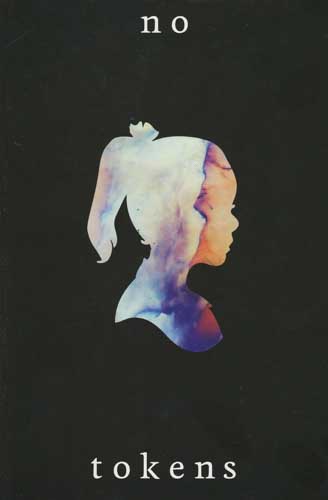No Tokens – February 2014
While No Tokens, a new, female-run literary journal from Brooklyn, was born partially out of a desire to remind people of the aesthetic pleasures of the print journal and help assure greater gender parity in the publishing world, it’s clear from the strength of their debut issue that the editors’ guiding principle of “celebrating work that is felt in the spine” was the primary criterion for selecting the fiction, poetry, and artwork in their inaugural issue. In the issue’s most arresting pieces of fiction and poetry, characters and speakers honestly appraise lives which have gained a momentum they can no longer passively abide or completely understand. While No Tokens, a new, female-run literary journal from Brooklyn, was born partially out of a desire to remind people of the aesthetic pleasures of the print journal and help assure greater gender parity in the publishing world, it’s clear from the strength of their debut issue that the editors’ guiding principle of “celebrating work that is felt in the spine” was the primary criterion for selecting the fiction, poetry, and artwork in their inaugural issue. In the issue’s most arresting pieces of fiction and poetry, characters and speakers honestly appraise lives which have gained a momentum they can no longer passively abide or completely understand. In other words, they’re stuck, watching as the gap between how things are and how they were intended to be fills with bad habits, evasive behavior, idealization, and moments of distilled candor.
All of the above are in evidence in David Hollander’s short story “The Forest of the Disappearing Man” in which Matthew, a husband, drug addict, and teacher at a Greenwich Village elementary school is “dumbstruck by his apparent connection to the man who bears his name . . . and above whom he floats zeppelin-like, as if tethered to some carnival of attractions.” Feeling valued only for the ways in which he meets others’ expectations, Matthew periodically retreats into the solitude of his childhood memory of a Vermont forest, a place where he isn’t reminded of his squandered potential and can experience “the ageless nonchalance of the self without language.” Told in vignettes, Hollander’s story deftly sketches Matthew’s slow untethering from the carnival of attractions that is his daily life.
Much like the character of Matthew in Hollander’s story, Celia, the mother in Anne-E. Wood’s first-person short story “Celia, 1978,” finds herself in her early thirties dealing with the oppressive narrowing of prospects that seems to have taken hold of her life. Weary of the total disclosure and daunting momentum of family life, Celia develops a rich interior life, which includes her idealization of a brief, long-ago dalliance with her husband’s vagabond brother. The generosity and specificity with which Wood characterizes each family member allows her to accurately capture the simultaneously complex, redeeming, and claustrophobic nature of family life.
One of the poetic standouts of the issue was undoubtedly Paula Saunders’s poem “Say This” in which a mother of two is given cause to reflect on the disparity between the value placed on familial versus career accomplishment when a friend admits to being unsure how to introduce her in a way that will make her seem interesting. In an insightful introduction to his wife’s work, author George Saunders isolates the essential quality that makes “Say This” so coercive, noting her “wonderful ability to look uninflectedly at a thing or an experience and report back what she actually finds there, cant, dogma, and habit be damned.” Speaking to her young, uncomprehending children near the poem’s end, the mother passionately expresses the importance of her role and radically calls into question what others perceive as worthwhile:
“I never did anything worthwhile
my whole life,” I say.
They stop and look up at me, confused, even the baby.
I turn my back.
They are vague circles of possibility
and I am
their best hope.
Why couldn’t she say
that?
In his poem “Undocumented Joy Rider In the Land of the Flesh,” Jeffrey McDaniel nearly has his poetic license revoked when he co-opts the harrowing plight of illegal immigrants for his own metaphorical purposes. The poet completes only one stanza of his hilariously forced metaphor in which god’s watchful eye shines down like the spotlight of “la migre” before the author’s conscience asserts itself:
Excuse me, señor fuckface,
sorry to interrupt your poem,
but you just can’t grab any subject
and turn it into a metaphor
to describe your spiritual pain.
I don’t care if your wife
and daughter are Hispanic.
Given McDaniel’s Brautigan-esque love of metaphor, it’s likely he’s had many an occasion to consider the imagination’s tendency to run ahead of good taste. Luckily, he’s finally put this consideration into a poem.
A special commendation is in order for the issue’s two portfolios of artwork as well. E. A. Bethea’s outré ink drawings, which look like what might have happened had Diane Arbus been given a Sharpie instead of a camera, provide the journal with a welcome injection of humor, while Xylor Jane’s colorful and conceptual, grid-based panels nicely compliment the introspection of the journal’s headier pieces. Neither too beholden to the surrounding literary content nor too discontinuous from it, the artwork is accessible and thoughtfully selected. E. A. Bethea also contributes artwork in the form of a nifty, detachable postcard filled with her “30 Second Renderings of Famous Hands.”
While No Tokens’s Editor-in-Chief T. Kira Madden has expressed an interest in including more genre-bending work in future issues, the journal’s first issue checks off a lot of boxes, boasting swank production values, a clean, consistent design, and dynamic works of fiction, poetry, and art from an impressive array of contributors. They’ve built a solid foundation, so get in on the ground floor.
[notokensjournal.com]





